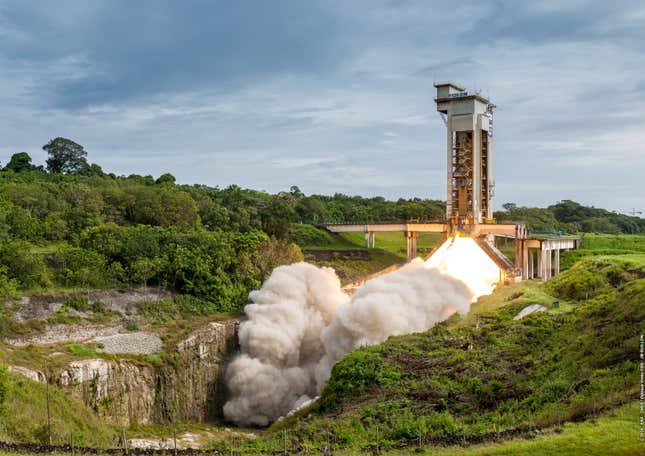
The highly anticipated first flight of Ariane 6 may finally take place this summer after years of delays. But before we can get too excited, European Space Agency Director General Josef Aschbacher is already setting the rocket up for failure without it even reaching the launchpad yet.
During a panel discussion at the 39th Space Symposium held this week, Aschbacher pointed out that heavy-lift rockets have a 47% chance of experiencing a major anomaly during their inaugural flights, European Spaceflight reported. Although he didn’t refer to Ariane 6 specifically, the statement puts a major damper on the upcoming debut of the long-awaited heavy-lift rocket.
Advertisement
Ariane 6 has been in development for more than a decade. The 197-foot-tall (60-meter) rocket is capable of lifting 10 metric tons to low Earth orbit, 4.5 metric tons to Sun synchronous orbital (SSO) altitudes reaching 500 miles (800 kilometers), and upwards of 10.5 metric tons to geostationary transfer orbits (GEO). French company Arianespace is developing the rocket on behalf of ESA, with Ariane 6 serving as a successor to the now-retired Ariane 5. The legendary rocket performed its final flight in July, ending a 27-year run.
Advertisement
During that time, Ariane 5 served as the European market’s main ride to space and, without it, Europe is scrambling for rocket options that can deliver its payloads to orbit. After cutting ties with Russia following the invasion of Ukraine, Europe was forced to stop relying on the Soyuz rockets for access to space. ESA recently turned to U.S. company SpaceX to deliver its Euclid telescope, which launched on July 1, 2023 aboard a Falcon 9 rocket.
Advertisement
The inaugural launch of Ariane 6 was initially slated for 2020 and later rescheduled to late 2022, mainly due to the covid-19 pandemic and additional technical hurdles encountered in its development. The maiden voyage of the rocket was consistently delayed after that, with a key test of the rocket’s upper stage in December 2023 aborted after two minutes of engine firing.
Arianespace did not publish any details regarding its investigation into the failed test. However, Ariane 6 is now tentatively scheduled for liftoff in June or July of this year. Even if the rocket does get to take off this summer, Aschbacher’s comments remind us that success is barely a 50-50 shot.
Advertisement
For more spaceflight in your life, follow us on X and bookmark Gizmodo’s dedicated Spaceflight page.
Services Marketplace – Listings, Bookings & Reviews